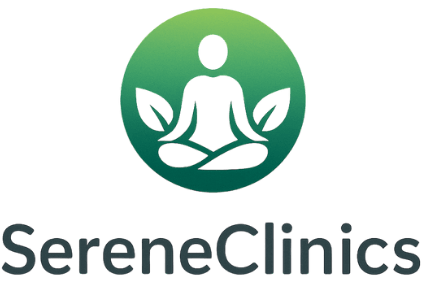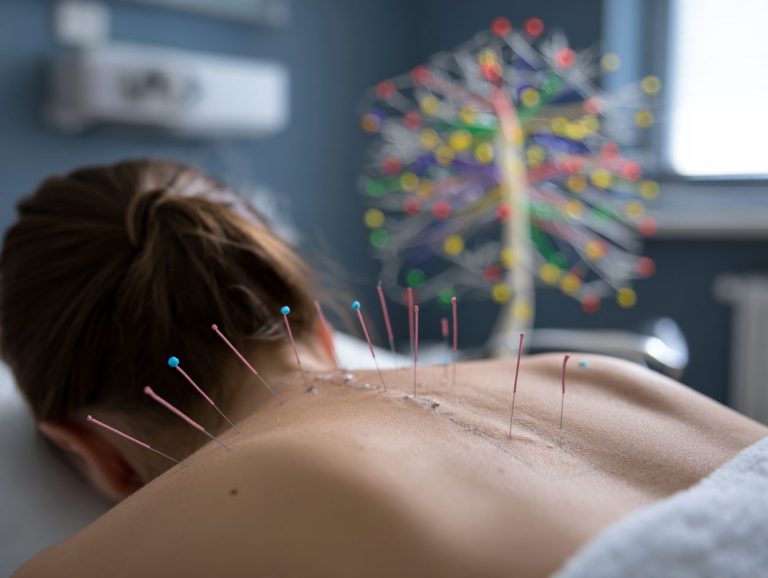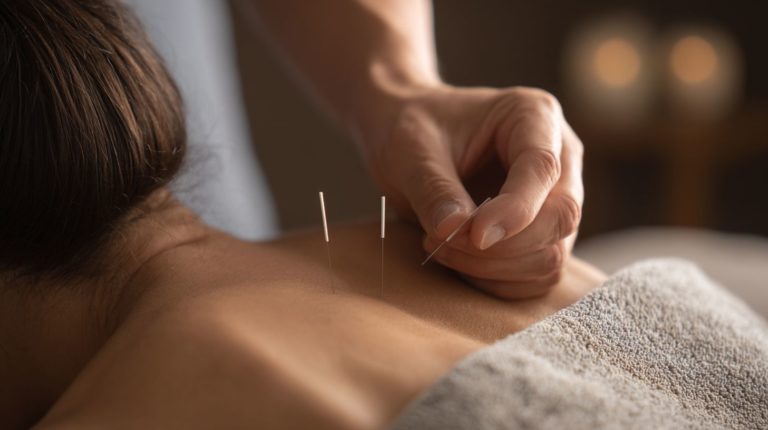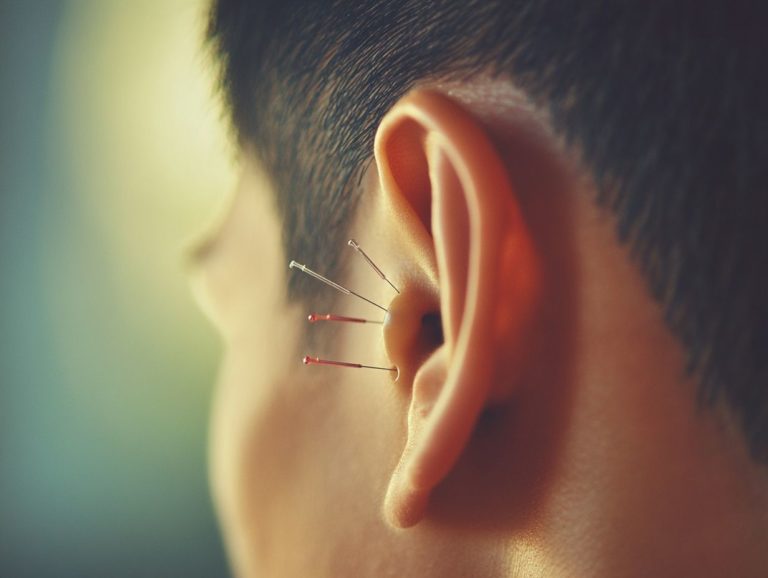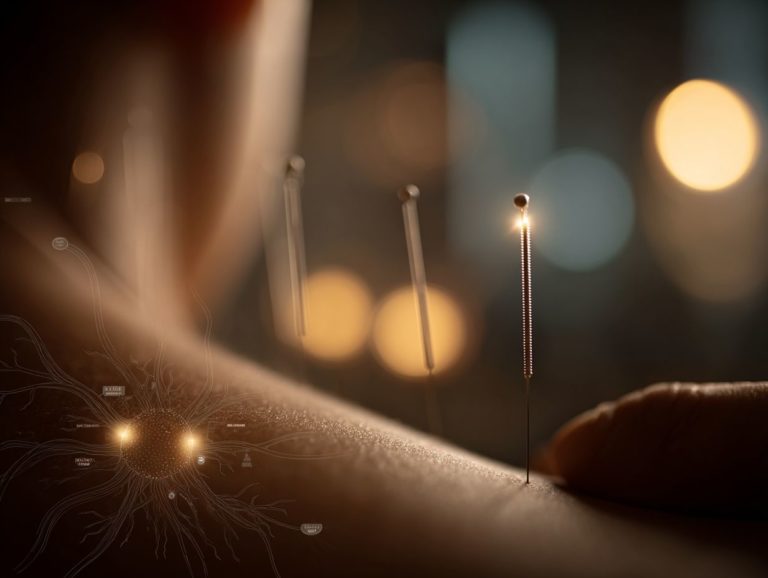Acupuncture in Traditional Chinese Medicine: Energy Flow
Acupuncture has emerged as a fascinating practice within Traditional Chinese Medicine (TCM), drawing interest for its unique approach to health and wellness.
This ancient technique revolves around the concept of Qi The essential life force that moves through our bodies. By managing this energy, acupuncture works to reduce pain, enhance mental health, and improve digestive function.
Learn how acupuncture functions, its many benefits, potential risks, and how to find a qualified practitioner to fully grasp this traditional art.
Key Takeaways:
Contents
- 1 What is Acupuncture?
- 2 How Does Acupuncture Work in Traditional Chinese Medicine?
- 3 What Are the Benefits of Acupuncture in Traditional Chinese Medicine?
- 4 Acupuncture Efficacy Statistics
- 4.1 Acupuncture Usage and Perception: Global Use
- 4.2 Acupuncture Usage and Perception: U.S. Acupuncture Adoption
- 4.3 Acupuncture Usage and Perception: RCT Study Statistics
- 4.4 Can Acupuncture Help with Pain Relief?
- 4.5 Does Acupuncture Improve Mental Health?
- 4.6 Can Acupuncture Help with Digestive Issues?
- 5 What Are the Potential Risks and Side Effects of Acupuncture?
- 6 How Is Acupuncture Performed in Traditional Chinese Medicine?
- 7 How to Find a Qualified Acupuncturist in Traditional Chinese Medicine?
- 8 Frequently Asked Questions
- 8.1 What is the concept of energy flow in Traditional Chinese Medicine?
- 8.2 How does acupuncture help improve energy flow in the body?
- 8.3 What are the common signs of imbalanced energy flow?
- 8.4 Can acupuncture help with specific health conditions related to energy flow?
- 8.5 Are there any potential side effects of acupuncture for energy flow?
- 8.6 How many acupuncture sessions are needed to improve energy flow?
What is Acupuncture?
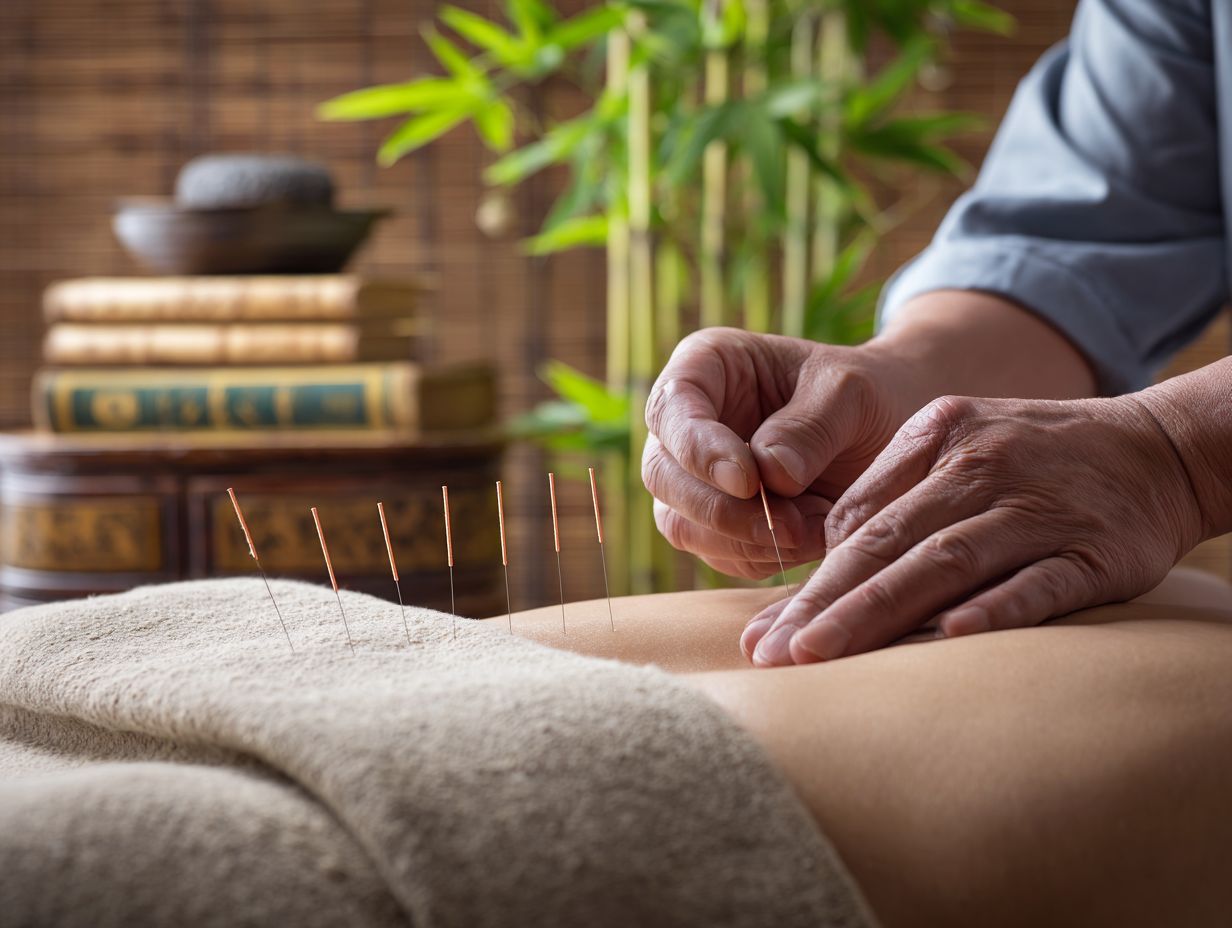
Acupuncture is an important part of traditional Chinese medicine (TCM). It involves placing clean needles into certain spots on the body to help with energy flow, called Qi.
This old healing method is used by trained acupuncture professionals to address various health issues, improve general health, and ease pain, especially long-term pain.
What is Traditional Chinese Medicine?
Traditional Chinese Medicine (TCM) is an old health system that includes different methods like acupuncture, herbal treatments, and food-based therapies. These methods focus on keeping the energy flow, known as Qi, even throughout the body.
Rooted in a history that spans thousands of years, TCM is built upon the foundational principles of Yin and Yang, emphasizing the necessity of harmony within oneself and with the surrounding environment.
Experts in this respected method understand that keeping a balanced state is important both for treating illnesses and preventing them. This focus on preventive care helps people improve their health and well-being over time, encouraging a lifestyle that aligns with the body’s natural rhythms and the seasons. According to Britannica, this holistic approach is central to TCM’s enduring appeal and effectiveness.
By recognizing how different parts of the body work together, TCM offers a complete approach that respects both the physical and spiritual sides of health. For a deeper understanding of the principles and practices that define TCM, our hidden gem on Traditional Chinese Medicine explores its ancient roots and modern applications.
How Does Acupuncture Work in Traditional Chinese Medicine?
In traditional Chinese medicine, acupuncture involves focusing on certain points on the body’s pathways to restore the balance of Qi, which is important for keeping healthy.
This method connects with the body’s energy paths, helping to relieve pain and improve health. Some studies from Frontiers in Neuroscience have explored the effects and mechanisms of acupuncture analgesia, providing deeper insights into its therapeutic benefits.
What is the Concept of Qi in Traditional Chinese Medicine?
In traditional Chinese medicine, Qi is seen as the essential energy that moves through the body’s meridian paths, playing an important role in managing wellness and health.
This energy is considered essential for maintaining balance and harmony within both the body and mind. Proper Qi levels help organs work well, aiding processes like digestion and keeping emotions balanced.
When problems happen, like blockages or shortages, people might face various health issues, such as feeling tired, long-lasting pain, or stomach problems. For instance, a deficiency in Qi is often linked to conditions like weakness and pallor, while blockages can manifest as anxiety or emotional disturbances.
Recognizing these issues and addressing them with treatments like acupuncture, herbal remedies, and changes in daily routines is important for improving health and energy.
How Does Acupuncture Affect the Flow of Qi?
Acupuncture affects the flow of Qi by stimulating specific acupuncture points on the body, helping to remove blockages and restore a balanced energy flow, which is essential for relieving discomfort and promoting health.
This process starts by inserting thin, sterile needles into specific points along the body’s energy channels, called meridians. Each needle’s placement is aimed at influencing the corresponding organ systems and harmonizing the flow of Qi.
As the needles trigger small physical changes, endorphins and other helpful chemicals are released, which create an overall sense of well-being. This technique has shown promising results in alleviating a variety of conditions, ranging from chronic pain and migraines to digestive disorders and anxiety, underscoring the importance of enhancing Qi flow for overall health.
What Are the Benefits of Acupuncture in Traditional Chinese Medicine?
Acupuncture provides various benefits in traditional Chinese medicine, such as pain relief for long-term conditions, emotional stability, and better immune system function, all supporting general health. According to research highlighted by the American Academy of Family Physicians, acupuncture has been shown to be effective in managing chronic pain, further validating its role in enhancing overall well-being. For those interested in learning more about how acupuncture manages pain, consider exploring our Chi Balancing Guide, which delves into its mechanisms and techniques.
Acupuncture Efficacy Statistics
Acupuncture Efficacy Statistics

Acupuncture Usage and Perception: Global Use
Acupuncture Usage and Perception: U.S. Acupuncture Adoption
Acupuncture Usage and Perception: RCT Study Statistics
The Acupuncture Efficacy Statistics give a detailed look at acupuncture’s worldwide use, acceptance in the U.S., and studies that prove it works, especially for long-term pain. This data is important for learning about acupuncture’s place in today’s healthcare and its increasing acceptance globally.
Acupuncture Usage and Perception reveals that acupuncture is practiced in 103 countries, with 129 countries reporting data, indicating widespread acceptance and interest. This global reach reflects acupuncture’s reputation as a complementary therapy for various health conditions, encouraging international integration into mainstream medical practices.
- U.S. Acupuncture Adoption: Between 2002 and 2022, the percentage of U.S. adults using acupuncture increased by 120%, from 1% in 2002 to 2.2% in 2022. Despite being a modest percentage, the rapid growth signifies increasing recognition of acupuncture’s potential benefits, driven by rising awareness and acceptance of alternative medicine among the American population.
RCT Study Statistics offer information about how well acupuncture works for managing long-term pain. Analysis of 39 randomized controlled trials (RCTs) involving 20,827 participants underscores robust research efforts. Of these, 53% used traditional methods, emphasizing the need to keep genuine practices in medical environments.
Studies indicate that acupuncture is being used more often in healthcare systems around the world, especially in the U.S. Many random controlled trials have found that acupuncture is a reliable method for managing long-term pain. This increasing evidence can help more people accept acupuncture, giving patients and healthcare providers different methods for managing pain and improving health.
Can Acupuncture Help with Pain Relief?
Acupuncture is widely recognized for its effectiveness in providing pain relief, particularly for chronic pain conditions such as myofascial pain, arthritis, and headaches.
This old method involves placing thin needles at certain spots on the body, which can trigger the release of endorphins and improve blood flow, helping to reduce pain.
Many individuals suffering from conditions like fibromyalgia, migraine, and lower back pain have reported significant improvements through acupuncture therapy. Research indicates that acupuncture can modulate the nervous system, reducing inflammation and promoting relaxation, which further helps in pain management.
Patient testimonials often highlight a reduction in pain intensity and improved quality of life, supporting the effectiveness of acupuncture as a viable treatment option.
Does Acupuncture Improve Mental Health?
Acupuncture can significantly improve mental health by promoting emotional balance and reducing stress, which are essential for overall wellness.
This therapy has gained attention for its ability to help reduce typical psychological issues, like anxiety and depression.
Many studies have shown that people receiving acupuncture often experience a significant drop in anxiety. One clinical trial found a 50% reduction in symptoms after six weeks of regular treatments.
The treatment is believed to stimulate the release of endorphins and other neurotransmitters that help regulate mood and promote a sense of calm.
As more people look for different options to standard treatments, acupuncture shows potential as an additional method to improve mental health.
Can Acupuncture Help with Digestive Issues?
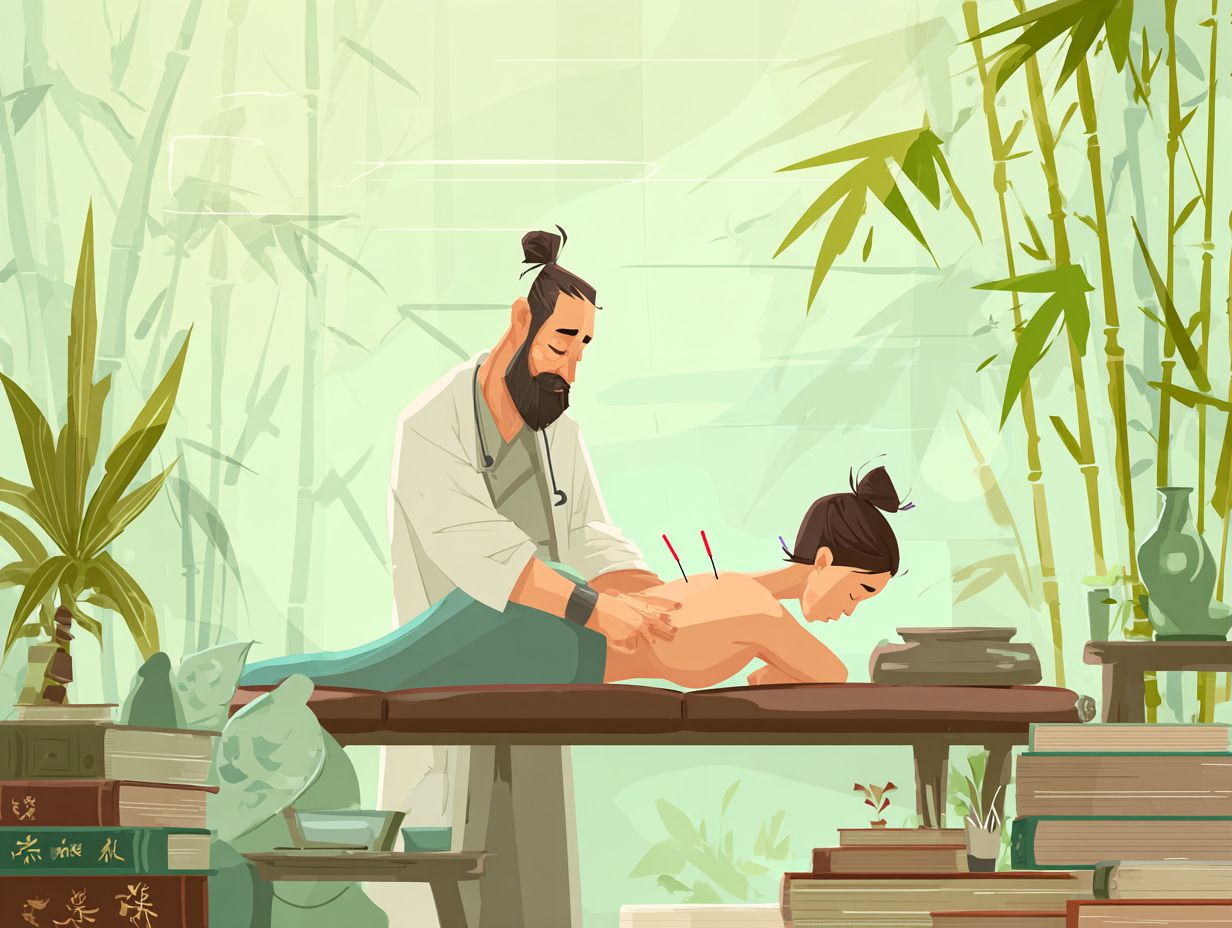
Acupuncture has been shown to be beneficial for various digestive issues, including nausea, irritable bowel syndrome, and other chronic conditions affecting gastrointestinal health.
This traditional Chinese medicine practice targets specific points on the body to promote healing and balance, effectively alleviating symptoms such as bloating, constipation, and food sensitivities.
Research indicates that acupuncture can support digestive function and reduce inflammation, making it beneficial for those with Crohn’s disease or ulcerative colitis.
Research shows it can help balance the digestive system, easing current issues and promoting lasting digestive health.
By enhancing the body’s natural healing processes, acupuncture contributes to overall health, helping patients achieve a more balanced and functional digestive system.
What Are the Potential Risks and Side Effects of Acupuncture?
When done by trained professionals with clean needles, acupuncture is usually safe. However, patients might have some risks and side effects, like minor bruising or soreness where the needles are inserted.
Is Acupuncture Safe?
Acupuncture is generally safe when performed by trained professionals using clean needles and correct methods to reduce risks.
These professionals often hold relevant licenses and have undergone extensive training, ensuring they are well-versed in both acupuncture and patient care.
The importance of sterilization cannot be overstated; it is critical that all needles and equipment are disinfected to prevent any potential infections.
Ahead of treatment, a thorough patient examination is essential; this allows the practitioner to assess individual health conditions and customize the approach accordingly.
Following these safety rules helps create a safe space where patients feel comfortable and have a positive experience during their treatment.
What Are the Common Side Effects of Acupuncture?
Common side effects of acupuncture may include mild discomfort at needle sites, slight bruising, or temporary dizziness, which typically resolve quickly.
These effects are generally considered mild when compared to the more pronounced side effects that can accompany conventional medical treatments, such as medication or surgery.
Patients can expect to feel relaxed during their sessions, often experiencing a sense of well-being afterwards. It’s also important to note that the likelihood of side effects can vary based on individual sensitivity and the treatment method used.
After acupuncture, many people say they feel more awake and calm, which can improve their general well-being. Patients should talk about their health issues with their doctor to know what to expect.
How Is Acupuncture Performed in Traditional Chinese Medicine?
Acupuncture is done by experienced professionals who create a personalized treatment plan after carefully examining the patient.
This involves carefully placing acupuncture needles into certain spots on the body to reach health goals.
What Tools are Used in Acupuncture Treatment?
The main tools used in acupuncture are needles. These needles are thin, sterile, and meant to be inserted at exact points on the body.
These needles come in various sizes and types, such as filiform needles, which are the most common and feature a fine shaft to minimize discomfort during insertion.
There are also specialized needles like intradermal needles, which are shorter and often used for more localized treatment.
Acupuncturists might use methods like moxibustion, where dried mugwort is burned close to acupuncture points to help with energy flow. They may also use cupping, which involves creating suction on the skin to improve blood flow and ease muscle tension.
These additional methods can make the treatment work better and cover more aspects.
What Are the Different Techniques of Acupuncture?

Acupuncture includes different techniques and methods, such as traditional Chinese acupuncture, Japanese acupuncture, and electro-acupuncture, which are adjusted to fit each patient’s needs.
These approaches vary in both their methods and the basic beliefs that direct their use.
For instance, traditional Chinese acupuncture focuses on balancing the body’s energy, or ‘Qi,’ striving to restore harmony through targeted point stimulation.
Japanese acupuncture differs by using thinner needles and focusing on a gentler treatment that prioritizes the patient’s needs.
Electro-acupuncture adds a modern element by using electrical stimulation to increase the benefits of acupuncture, which is especially helpful for managing pain.
To be skilled in these techniques, practitioners need to understand the body’s structure, how it works, and how energy flows within it. This helps make sure each treatment works well and suits the individual.
How to Find a Qualified Acupuncturist in Traditional Chinese Medicine?
Choosing an experienced acupuncturist is important for getting safe and effective treatment in traditional Chinese medicine. Patients should find practitioners who have the right qualifications and practical experience.
It is important to thoroughly examine options when looking for an experienced professional. Start by verifying their qualifications, such as certifications from reputable acupuncture schools and licenses to practice in your state or country. For guidance on evaluating these credentials, consider our detailed guide on choosing an acupuncture practitioner.
Looking at patient reviews can give useful information about how well treatments work and how happy patients are with their care. Feel free to ask about the practitioner’s treatment methods and beliefs. Knowing their approach helps you align with your health goals.
Choosing a good acupuncturist increases your chances of success and improves your health experience.
Frequently Asked Questions
What is the concept of energy flow in Traditional Chinese Medicine?
In Traditional Chinese Medicine, energy flow means the movement of qi (pronounced “chee”) through the body. Qi is thought to be the life force that gives life to all creatures and is important for staying healthy and feeling good.
How does acupuncture help improve energy flow in the body?
Acupuncture involves the insertion of thin needles into specific points on the body, known as acupuncture points, to stimulate the flow of qi and restore balance in the body. This helps to improve the overall energy flow and promotes healing and wellness.
What are the common signs of imbalanced energy flow?
In Traditional Chinese Medicine, imbalanced energy flow can manifest in various physical, emotional, and mental symptoms. These can include pain, fatigue, digestive issues, mood swings, anxiety, and insomnia, among others.
Yes, acupuncture can be beneficial for a wide range of health conditions that are believed to be related to imbalanced energy flow. This includes chronic pain, digestive disorders, allergies, stress, and many others.
Are there any potential side effects of acupuncture for energy flow?
Acupuncture is generally considered to be a safe and non-invasive treatment. However, some people might have small side effects like bruising, soreness, or feeling dizzy after a session. These should go away within a few hours to a day.
How many acupuncture sessions are needed to improve energy flow?
The number of sessions needed may vary depending on the individual’s condition and response to treatment. Some people may experience improvements after just a few sessions, while others may need regular treatments over a longer period of time. Your acupuncturist can recommend a treatment plan based on your specific needs.

Sheetal Sharda has a background in CS. She got an interest in Holistic living back in 2018, and has since started exploring more into Naturapathy, Holistic Living, Yoga, and more. She got inspired to start SereneClinics to help people find reliable centers across the world.
